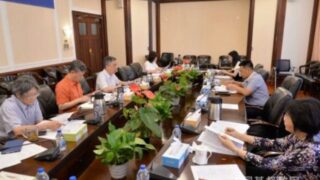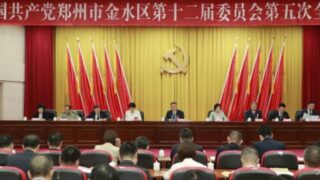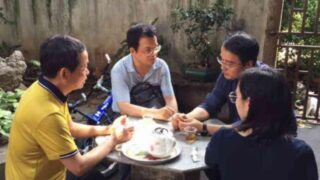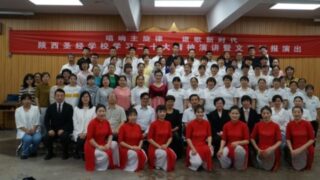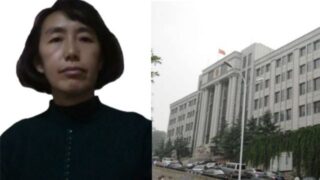By coercing congregations into signing mandatory “donation agreements” to give away churches, authorities attempt to present forced takeovers as “legitimate.”
by Zhou Xiaolu
Vastly reducing the number of churches to deprive believers of places to worship is the most common means by which the CCP suppresses and tries to eliminate Christianity. Apart from violent forced demolitions of churches, authorities also forcibly repurpose and convert churches into entertainment venues or “legally” occupy them through forced donations, turning religious meeting venues into government offices.
Entertainment replaces religion
In November 2018, the Religious Affairs Bureau of Qishan county, under the jurisdiction of Baoji city in the northwest province of Shaanxi, forcibly dismantled the cross on a Catholic church in Luojiazhuang village, claiming that the building was an “illegal construction,” and placed the church on the list of sites to be demolished.


This April, the local government changed its plan and decided to convert the church into a cultural and sports activity center for villagers. Hoping to at least save the building, the person in charge of the church was forced to agree.
Shortly afterward, the church was altered beyond recognition: the red glazed tiles on the roof were painted gray and yellow exterior walls – white; the church’s octagon-shaped window was changed into a square form. Posters listing the core socialist values and other political slogans were displayed on the church’s exterior walls, and a signboard reading “Villagers’ Cultural and Sports Activity Center” was put up above the main entrance.
The altar inside the church was demolished. Instead, tables to play ping-pong or Chinese chess were brought in. Posters promoting Chinese entertainment, such as calligraphy and painting or playing China-native instruments and games were posted on the walls inside.


Three-Self churches converted into village committee office
On May 20, under pressure from the government, believers at a Three-Self church in Nanjialu village, located in Pucheng county under the jurisdiction of Shaanxi’s Weinan city, were forced to remove the cross on the top of the church and the Chinese character for “love” directly below it. They were also required to remove all religious symbols.
But the persecution didn’t end there. On June 1, local government officials threatened the person in charge of the church to demolish the building unless he donated it to the village committee. Having no other choice, he signed the “donation agreement.” The Chinese national flag was immediately placed at the top of the church, with the CCP emblem underneath it. On either side of the church’s wall, slogans related to the “cleaning up gang crime and eliminating evil” campaign were put up. The church officially became the village committee office.


On June 13, another Three-Self church in Pucheng county was also forcibly repurposed for a village committee office. The cross at the top of the church was replaced with the national flag, and Chinese characters for “Christian Church” were replaced with a propaganda slogan “People have faith, the country has power, and the nation has hope.”


Numerous Three-Self churches across the central province of Henan have also been taken over by the government. In May, officials from the urban and rural integration demonstration zone of Sanmenxia city demanded that all unlicensed churches and religious gathering venues be confiscated and transferred to the state. According to local believers, more than a dozen Three-Self meeting venues were forcibly “donated” to the government in the zone’s Yangdian town alone.


After refusing to sign a “donation agreement,” the person in charge of a Three-self church in the zone was threatened by the village secretary, “You can’t reason with the Communist Party! If you don’t sign it, the church will be demolished.”
In June, two more Three-Self meeting venues in Henan – one in Jiyuan city’s Kejing town and another in Xinyang city’s Pingqiao district – were forced to donate their building to the government.


